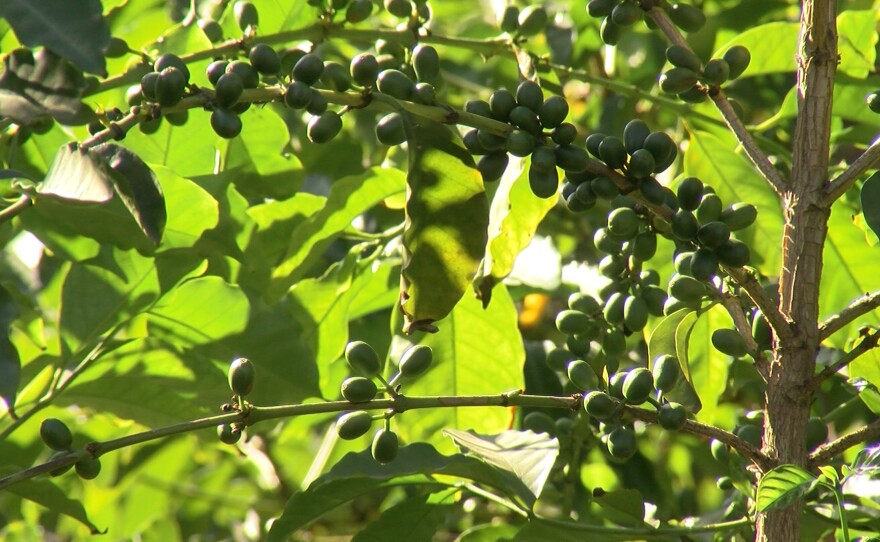Coffee is typically grown in tropical regions and was previously considered an unviable crop in the continental United States. But along the state Route 76 corridor in San Diego’s North County, farmers are growing California coffee.
Singer-songwriter Jason Mraz owns one of those farms in East Oceanside, in the South Morro Hills community. Five years ago he became one of the first farmers in the region to plant coffee trees.
“It’s not easy to harvest. I mean it could take you all day just to harvest one [coffee plant]. Because you go blind in the sunlight or the shade, or you’re sticky with insects or the fruit,” Mraz said. “You’re trying to identify the dark-colored cherries, which once they all start to turn red or purple it's kind of hard to remember which ones are ripe.”
Mraz’s coffee trees tower overhead at nearly 10 feet tall and are planted between avocado, banana and other full-sized fruit trees in dense tropical terrain.
He has 11 species of coffee on his 18-acre property and recently started selling his coffee beans commercially.
The varieties of coffee fruit, or cherries as farmers call them, that grow on his 3,500 coffee trees are considered rare.
Oftentimes the beans carry hefty price tags once roasted — especially a variety called Geisha.
“Whether it's through folklore, or legendry that it's a brilliant bean — or just continued testing, drinking and scoring high — it continues to just outperform all other coffees,” Mraz said.
The self-described “singer-songfarmer” and all coffee growers across California get plant material, farming knowledge, and post-harvest processing from a company called FRINJ Coffee.
FRINJ co-founder and CEO Jay Ruskey first started his journey into California coffee about 20 years ago. Over the past few years, the coffee industry has started to take notice of his plan.
“I submitted some coffees to Coffee Review, we got like 27th in the world, and got a lot of press on that. And then all of a sudden, I realized there was a chance that we could do something bigger,” Ruskey said.

FRINJ Coffee now works with 67 farms across the state and 42 farms in San Diego County. That means the San Diego region accounts for nearly two-thirds of the coffee farms in California.
Coffee cherries from the Golden State are known for their slow-growing process, which Ruskey said enhances their flavor profiles. He equates the growing process, blending methods and market for California coffee to another product: California wine, which is produced in some of the same regions where coffee is now growing.
“The farmers out there in Southern California, mainly in Santa Barbara, Ventura and San Diego were looking for something new, and so FRINJ Coffee and our coffee program was something they thought they could adapt,” Ruskey said.
RELATED: Measure L: Deciding The Future Of Oceanside’s Farmland
While getting a coffee farm started in California is a challenge, the FRINJ team shares planting and care methods with farmers like Mraz.
“In these aging avocado groves, which are all throughout San Diego, you can put a row of coffee between them,” said Mraz. “I don't want to make it sound like it's easy, but there is a symbiosis or a relativity between the coffee and the avo that does really well.”
Bluetail Coffee Grove owner Kyle Rosa learned early that coffee growing can be challenging in San Diego. He lost 37% of his crop during his first year due to unforeseen overnight temperatures that got too cold.
“I have something new to worry about at every stage. Can I get them in the ground? Yes. Will they grow? Yes. Will they produce cherries? Yes. Now my next stage is will the cherries be of high quality, and that's my next worry and concern,” he said.
Rosa’s farm lies between Vista and San Marcos. He has yet to sell his product commercially but he is set to open a “drinkery” called Breakers Coffee + Wine in Del Mar this spring. The establishment hopes to feature San Diego coffee varieties and will offer coffee and wine tastings.
“Whether you want the caffeine buzz or the alcohol buzz is up to you. But being able to explore new lands in terms of coffee and wine is what we are really pushing,” Rosa said.
RELATED: Fourth Generation Of The Yasukochi Family Continues Farming In North County
While California’s coffee industry is still in its infancy, Mraz sees it continuing to grow, perhaps joining other prized industries in the state.
He said there could even be a future in agritourism for the North County.
“Even if people just wanted to drive around and look at fruit trees, this is a unique place to do that — to see things that you may have never seen with your eyes before," Mraz said. "As this continues, I hope to see tasting experiences, farm tours, just more and more people appreciating where their coffee, where their food comes from altogether.”
While California coffee prices are high and supply is currently limited, San Diegans may one day soon see California coffee on the menu of their local cafés.








